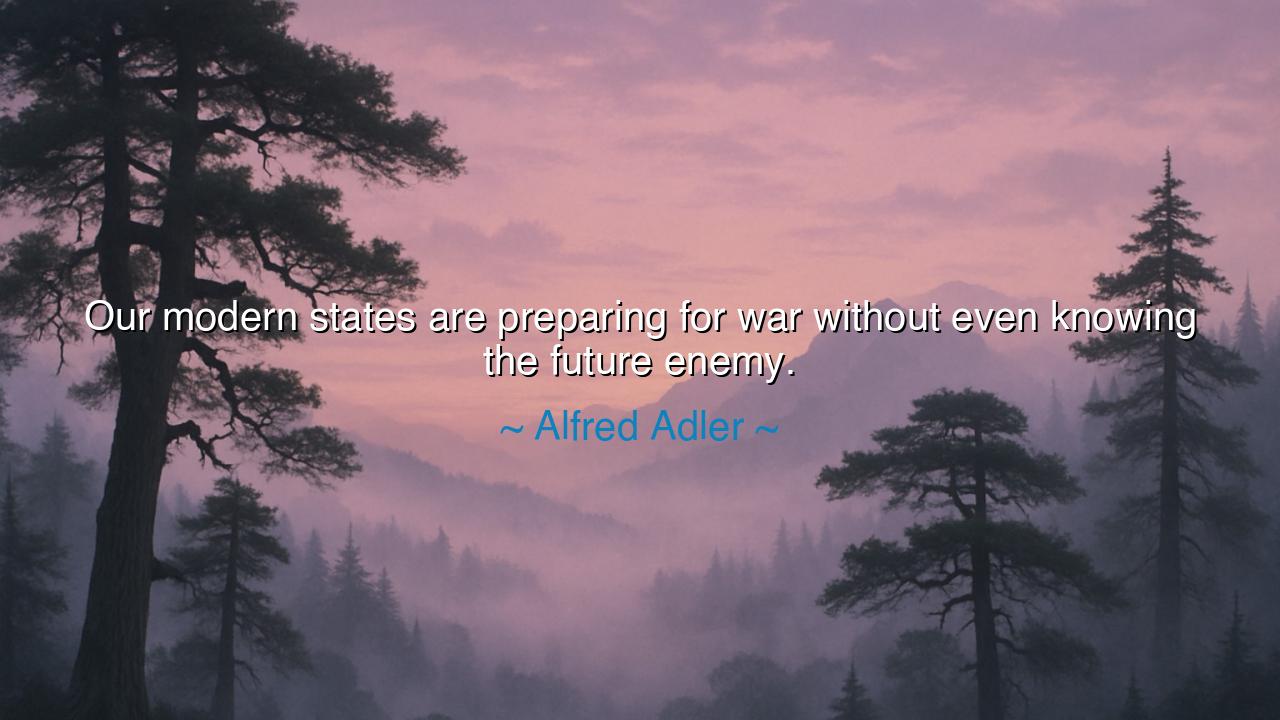
Our modern states are preparing for war without even knowing the






"Our modern states are preparing for war without even knowing the future enemy." These words by Alfred Adler strike at the heart of a profound truth about the nature of modern conflict, strategy, and the unknown forces that shape our world. Adler, a visionary of his time, understood that in the ever-evolving landscape of human society, nations often focus their energies on preparing for battles that may not even be relevant to the future they are shaping. The enemy of today may not be the enemy of tomorrow, and yet, governments and societies persist in fighting shadows—unseen and unrecognizable.
To understand Adler's statement, one must first reflect on the very nature of modern warfare. The great battles of the past—whether fought with swords and shields or cannons and tanks—were fought with clear, defined enemies. Wars could be waged against specific nations, ideologies, or forces, and victory was measured in tangible outcomes. Yet, as the world has grown more interconnected and complex, the lines between allies and adversaries have become blurred. Technology, cyber warfare, and economic dominance are now the frontlines of modern conflict. In this age, how does one prepare for an enemy who may not even wear a uniform or carry a weapon? The future enemy may come in the form of data, a virus, or even ideological extremism—forces that cannot be identified or fought with traditional military might.
This notion is not new. History is filled with examples of civilizations preparing for conflicts that never came to pass. Consider the Roman Empire, which spent much of its energy building walls, armies, and fortifications to defend against barbarian invasions. Yet, in the end, the fall of Rome was not the result of a singular military force but the culmination of economic decline, internal corruption, and political instability—enemies that the Empire was ill-prepared to face. Similarly, the Cold War era in the 20th century saw both the United States and the Soviet Union preparing for the threat of nuclear war, yet the ultimate end of the Cold War came not through battle, but through diplomacy, internal reforms, and shifting global alliances. Adler’s wisdom lies in understanding that the true nature of conflict is often shaped by forces unseen, and the preparations we make today may not be the ones that will ultimately define our future.
The idea that we are preparing for an unknown enemy is not just a reflection of geopolitical strategy but also a broader observation about the human condition. Just as nations prepare for war without understanding the full scope of what the future holds, we as individuals often prepare ourselves for challenges we cannot foresee. Adversities may arise in ways we cannot predict—whether in the form of personal loss, economic hardship, or health crises. Yet, like nations, we often arm ourselves with outdated tools, focusing on familiar fears rather than the unknown possibilities that lie ahead. True preparation, Adler suggests, is not simply about defending against what we know, but about cultivating resilience and adaptability, for the real battles we face are often those we least expect.
Consider the outbreak of the COVID-19 pandemic—a perfect example of an enemy that the world was not prepared for. Nations had spent billions of dollars on military might and defense against traditional warfare, but the true threat was an invisible virus that could neither be seen nor fought with conventional weapons. This new enemy, in the form of a pandemic, exposed the limitations of traditional warfare preparations. Yet, the response to the crisis—through global cooperation, scientific innovation, and healthcare mobilization—was a reminder that the future may bring challenges that are not fought on battlefields but in hospitals, labs, and communities.
Adler’s insight also speaks to the growing need for foresight in addressing global challenges. Preparing for the future is not just about anticipating the next military conflict, but about understanding the deeper, more complex issues that will shape the world. The climate crisis, technological disruption, social inequality, and cybersecurity are just a few examples of the challenges that will define the 21st century. These are the enemies that nations must face, not with the weapons of the past, but with new forms of cooperation, innovation, and foresight.
The lesson here is that the true challenge is not to prepare for the obvious or the immediate, but to cultivate the ability to adapt and respond to the unexpected. Preparation must go beyond traditional military might or political strategy; it must involve flexibility, resilience, and the wisdom to confront new and unforeseen enemies. Nations, like individuals, must be prepared not only to defend what they know but to embrace change and adapt to new realities. In our own lives, we must not only prepare for the challenges we expect but for the ones we cannot even imagine.
Adler's wisdom calls us to recognize that true strength lies in our ability to face the unknown with open eyes and an adaptable spirit. We cannot predict the future enemies we will face, but we can build societies, systems, and individuals capable of rising to meet them. Preparation for the unknown requires not only awareness of the present but the courage to embrace the future, no matter what shape it takes. Let us strive not only to build walls against known threats but to open our hearts and minds to the future, ready to meet whatever challenges it may bring.






AAdministratorAdministrator
Welcome, honored guests. Please leave a comment, we will respond soon